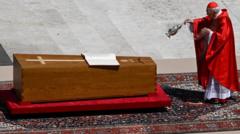The Israeli Prime Minister's office offered delayed condolences for Pope Francis following his death, with a notably low-profile representation at the funeral, signifying discontent with the Pope's remarks on the Gaza conflict and his support for the Palestinian people.
Tensions Surface in Israel's Response to Pope Francis's Death Amid Gaza Conflict

Tensions Surface in Israel's Response to Pope Francis's Death Amid Gaza Conflict
The Israeli government's muted reaction to Pope Francis's passing, characterized by belated condolences and a lower-level funeral delegation, reflects ongoing tensions over his comments regarding the Gaza situation.
Israel's Prime Minister Benjamin Netanyahu's office has faced backlash for its delayed and subdued response to the death of Pope Francis, which could be interpreted as a reflection of the heightened tensions stemming from the ongoing Gaza conflict. While the Prime Minister's office eventually issued a short, impersonal statement expressing condolences to the Catholic Church and its community worldwide, many noted its belated nature, appearing four days after the Pope's passing.
Earlier, an attempt to convey condolences through the official state Twitter account was abruptly retracted, igniting considerable controversy within Israel. The original tweet featured a more heartfelt tone, including a warm photo of the Pope at the Western Wall and a blessing for his memory. However, it was removed without any explanation, leading to speculation regarding the Israeli government’s discomfort with the Pope's previous comments on the conflict in Gaza.
Israeli media reported that the deletion was characterized as an "error" by officials, with former ambassador to the Vatican, Raphael Schutz, labeling it a mistake. Despite this controversy, Israeli officials did highlight that Yaron Sideman, the current ambassador to the Vatican, personally expressed condolences and will represent Israel at the Pope's funeral. This choice of a low-level delegation starkly contrasts with dignitaries from most other nations, including former US President Donald Trump, and stands in sharp relief to Israel's high-profile representation at the funeral of Pope John Paul II in 2005.
The muted response from Israeli leaders seems further complicated given the broader context of Pope Francis's comments on the Gaza conflict. In the past, he has made statements urging international scrutiny of Israel's military actions in Gaza, even suggesting the potential classification of these actions as genocide—a claim Israel has firmly rejected. His pastoral attention to the plight of Palestinians, particularly during wartime, resonated deeply within Gaza and has been viewed by some in Israel as a show of disfavor towards the Jewish state.
While Israeli President Isaac Herzog did issue a touching tribute shortly after the Pope's death, he did not make plans to attend the funeral, a decision likely linked to the event's timing on Shabbat, the Jewish Sabbath. Nevertheless, the absence of Israel's executive leadership at such a prominent event, particularly in light of Pope Francis’s robust advocacy for dialogue among different faiths, underscores the complexity of the relationship between the Vatican and the current Israeli government. At the same time, the Palestinian Authority’s decision to send Prime Minister Mohammad Mustafa highlights the respect held by Palestinians for the Pope’s empathetic approach toward their suffering. As these narratives unfold, the main takeaway suggests a significant schism between Israel and the Vatican, likely to be visible amidst the dignitaries gathered in Rome for the Pope's funeral.






















